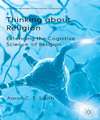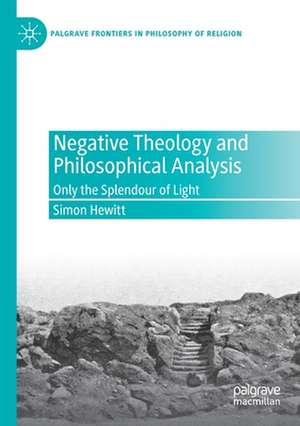Negative Theology and Philosophical Analysis: Only the Splendour of Light: Palgrave Frontiers in Philosophy of Religion
Autor Simon Hewitten Limba Engleză Paperback – 18 aug 2021
Hewitt diagnoses the unease with apophaticism amongst contempory philosophical theologicans as rooted in a certain picture of how language functions, here called referentialism. Arguing that this picture is not compulsory, an account of language which sits more comfortably with negative theology (originating from work of later Wittgenstein) is invoked, and appliedto key themes in philosophical theology including divine personhood, the Trinity, the Incarnation and the afterlife.
| Toate formatele și edițiile | Preț | Express |
|---|---|---|
| Paperback (1) | 634.82 lei 6-8 săpt. | |
| Springer International Publishing – 18 aug 2021 | 634.82 lei 6-8 săpt. | |
| Hardback (1) | 640.06 lei 6-8 săpt. | |
| Springer International Publishing – 18 aug 2020 | 640.06 lei 6-8 săpt. |
Din seria Palgrave Frontiers in Philosophy of Religion
- 20%
 Preț: 691.33 lei
Preț: 691.33 lei - 15%
 Preț: 522.56 lei
Preț: 522.56 lei - 18%
 Preț: 727.18 lei
Preț: 727.18 lei -
 Preț: 391.61 lei
Preț: 391.61 lei - 18%
 Preț: 725.43 lei
Preț: 725.43 lei -
 Preț: 380.07 lei
Preț: 380.07 lei -
 Preț: 350.12 lei
Preț: 350.12 lei -
 Preț: 391.61 lei
Preț: 391.61 lei - 15%
 Preț: 641.53 lei
Preț: 641.53 lei - 18%
 Preț: 727.18 lei
Preț: 727.18 lei -
 Preț: 386.99 lei
Preț: 386.99 lei -
 Preț: 263.45 lei
Preț: 263.45 lei -
 Preț: 357.63 lei
Preț: 357.63 lei -
 Preț: 386.81 lei
Preț: 386.81 lei - 18%
 Preț: 786.66 lei
Preț: 786.66 lei -
 Preț: 452.03 lei
Preț: 452.03 lei -
 Preț: 387.75 lei
Preț: 387.75 lei -
 Preț: 381.98 lei
Preț: 381.98 lei -
 Preț: 382.18 lei
Preț: 382.18 lei -
 Preț: 386.81 lei
Preț: 386.81 lei - 18%
 Preț: 789.20 lei
Preț: 789.20 lei - 15%
 Preț: 524.88 lei
Preț: 524.88 lei -
 Preț: 482.17 lei
Preț: 482.17 lei - 15%
 Preț: 529.92 lei
Preț: 529.92 lei - 18%
 Preț: 787.61 lei
Preț: 787.61 lei - 18%
 Preț: 722.12 lei
Preț: 722.12 lei -
 Preț: 387.96 lei
Preț: 387.96 lei -
 Preț: 393.52 lei
Preț: 393.52 lei - 18%
 Preț: 1122.42 lei
Preț: 1122.42 lei -
 Preț: 391.61 lei
Preț: 391.61 lei
Preț: 634.82 lei
Preț vechi: 746.84 lei
-15% Nou
Puncte Express: 952
Preț estimativ în valută:
121.49€ • 126.37$ • 100.30£
121.49€ • 126.37$ • 100.30£
Carte tipărită la comandă
Livrare economică 12-26 aprilie
Preluare comenzi: 021 569.72.76
Specificații
ISBN-13: 9783030496043
ISBN-10: 303049604X
Pagini: 191
Ilustrații: XXIV, 191 p. 1 illus.
Dimensiuni: 148 x 210 mm
Greutate: 0.26 kg
Ediția:1st ed. 2020
Editura: Springer International Publishing
Colecția Palgrave Macmillan
Seria Palgrave Frontiers in Philosophy of Religion
Locul publicării:Cham, Switzerland
ISBN-10: 303049604X
Pagini: 191
Ilustrații: XXIV, 191 p. 1 illus.
Dimensiuni: 148 x 210 mm
Greutate: 0.26 kg
Ediția:1st ed. 2020
Editura: Springer International Publishing
Colecția Palgrave Macmillan
Seria Palgrave Frontiers in Philosophy of Religion
Locul publicării:Cham, Switzerland
Cuprins
1. God beyond Words.- 2. Analytic Criticisms of Apophaticsm.- 3. Analytic Apophaticisms.- 4. Representatialism and Religious Language.- 5. Grammatical Thomism.- 6. The Grammar of God-Talk.- 7. Speaking of God: truthfully and devotedly.- 8. Is God a Person?.- 9.Incarnation and Trinity.- 10. Politics, Kingdom, Beatific Vision.
Notă biografică
Simon Hewitt is Leverhulme Early Career Fellow in the School of Philosophy, Religion and the History of Science at the University of Leeds, UK.
Textul de pe ultima copertă
This book is the first treatment at length of negative, or apophatic, theology within the analytic tradition. Apophatic theology holds that there is a significant sense in which we cannot say what God is. Important negative theological elements are present in a host of Christian thinkers, from Gregory of Nyssa to Aquinas, and yet apophaticism is neglected in philosophical theology as practiced within the analytic tradition. By contrast, Hewitt shows how apophatic theology is integral to how Christians have thought about God, and how it can be defended against standard attacks in the philosophical literature.
Hewitt diagnoses the unease with apophaticism amongst contempory philosophical theologicans as rooted in a certain picture of how language functions, here called referentialism. Arguing that this picture is not compulsory, an account of language which sits more comfortably with negative theology, (originating from work of later Wittgenstein), is invoked, and applied to key themesin philosophical theology including divine personhood, the Trinity, the Incarnation and the afterlife.
Caracteristici
Shows that negative theology is an integral part of how Christians have thought about God Emphasizes the work of a strand of philosophical theology influenced by Wittgenstein as well as Aquinas Makes the case for a broader understanding of analytic theology, grounded in a broader understanding of the analytic tradition
